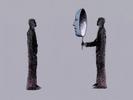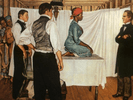Shankar Vedantam appears in the following:
Inside The Hole: What Happens To The Mind In Isolation?
Monday, April 03, 2017
The use of solitary confinement in prisons has grown since the 1970s. Criminologist Keramet Reiter talks with us about the psychological effects that long-term isolation has on our minds.
The Truth Is, Lying Might Not Be So Bad
Tuesday, March 28, 2017
With repeated lies, the brain becomes less and less sensitive to dishonesty, supporting ever larger acts of dishonesty. But why do we lie and is it such a terrible thing if we do?
Everybody Lies, And That's Not Always A Bad Thing
Monday, March 27, 2017
When we think of lies, we think of the big stuff. We say, "I could never do something like that." But big lies start with small deceptions. Dan Ariely talks about why we lie and why we're honest.
How The 'Scarcity Mindset' Can Make Problems Worse
Thursday, March 23, 2017
Researchers had a hypothesis that when you really want something, you start to focus on it obsessively. It produces a kind of tunnel vision and creates problems for thinking in the long-term.
The Scarcity Trap: Why We Keep Digging When We're Stuck In A Hole
Monday, March 20, 2017
When you really need something — whether it's money, food, or even time — it can be hard to focus on anything else. Researchers call this scarcity, and say it can affect many aspects of our lives.
Why Piling On Facts May Not Help In The Battle Against Fake News
Tuesday, March 14, 2017
As the country has become more polarized, we increasingly disagree not just on policy, but on the facts. Can more and better information solve the problem of fake news?
When It Comes To Politics and 'Fake News,' Facts Aren't Enough
Monday, March 13, 2017
In politics, it sometimes feels like we can't agree on basic facts. But according to neuroscientist Tali Sharot, facts are not enough — emotions may be the key to changing our minds.
The Affordable Care Act, Medicaid And Divorce
Wednesday, March 08, 2017
As Republicans unveil their Affordable Care Act replacement, we examine how Medicaid expansion has affected divorce rates among older people.
Tribes & Traitors: What Happens When You Empathize with the Enemy?
Monday, March 06, 2017
This week on Hidden Brain, the stories of two men who showed empathy for the other side and found themselves labeled "enemy" by their own people.
New Research Looks At Ways To Help Stop Airbnb Racial Discrimination
Thursday, March 02, 2017
Airbnb has come under fire in the last year following reports that hosts are less likely to rent to African-Americans compared to whites. New research looked at ways to address the discrimination.
Chicago Leaders Use Cognitive Behavorial Therapy To Combat Violent Crime
Tuesday, February 28, 2017
Chicago is in dire need of solutions for its violent crime. A cognitive behavioral therapy program has been able to help keep teenage boys from acting out on their impulses.
Finding The Punchline: Maz Jobrani On Comedy In The Trump Era
Monday, February 27, 2017
Maz Jobrani, an Iranian-American comedian, uses humor to critique President Trump — whom he describes as "good for comedy but bad for the world."
Does Studying Economics Make You Selfish?
Tuesday, February 21, 2017
Social science research finds that students who are taught classical economics about how humans act in their rational self-interest, become more likely to act selfishly after learning those lessons.
On the Knife's Edge: Using Therapy To Address Violence Among Teens
Tuesday, February 21, 2017
We hear a lot about senseless violence: people who lose their lives or their freedom over a stolen backpack, or perceived slight. Two researchers think social science might help prevent these crimes.
Researchers Examine Race Factor In Car Crashes Involving Pedestrians
Wednesday, February 15, 2017
Cars are less likely to stop when people of color step into intersections, a study says. That may partly explain why there are higher levels of pedestrian deaths among racial minority communities.
Hookup Culture: The Unspoken Rules of Sex on College Campuses
Tuesday, February 14, 2017
Research suggests that college students are not having more sex than their parents were a generation ago. But sociologist Lisa Wade says the culture around sex has changed dramatically.
How Biases Affect Stock Analyst Predictions
Thursday, February 09, 2017
Research shows that financial analysts have biases in things like gender and names when it comes to evaluating companies.
Remembering Anarcha, Lucy, and Betsey: The Mothers of Modern Gynecology
Tuesday, February 07, 2017
J. Marion Sims is remembered as the father of modern gynecology. Forgotten are the mothers of that medical specialty — the enslaved women whose bodies were used for the advancement of his research.
Why Eating The Same Food Increases People's Trust And Cooperation
Thursday, February 02, 2017
All over the world, people say they make friends by "breaking bread together." Social science research explores why sitting down to eat together makes people feel closer.
Fortress America: What We Can — And Can't — Learn From History
Tuesday, January 31, 2017
President Trump's executive order on refugees left travelers stranded at airports worldwide. To some, the scenes evoked images of Jewish refugees during World War II. We investigate the parallels.









